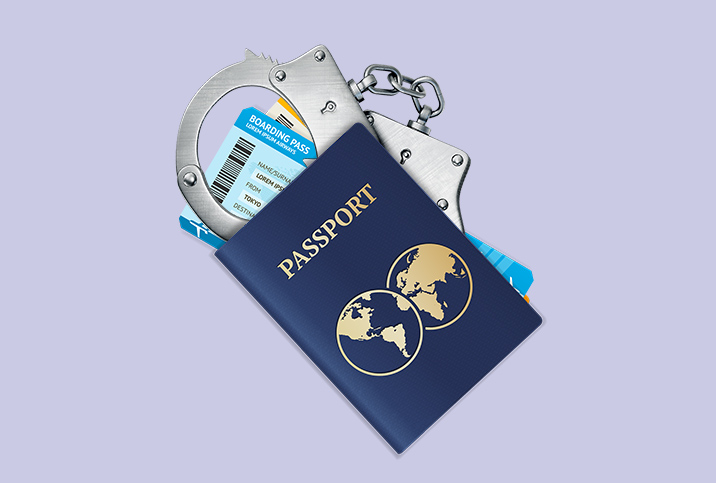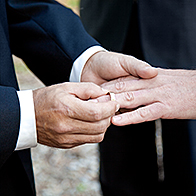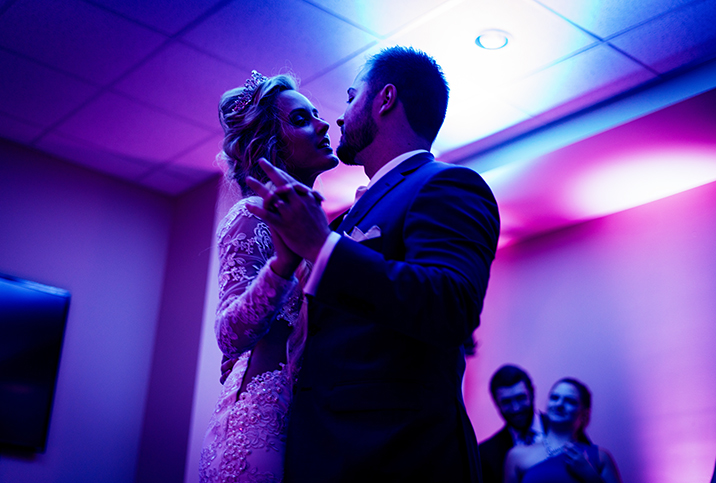Love and Law: A Destination Wedding Checklist

Whether you're saying "I do" on the pristine shores of Seychelles or in Alaska's winter wonderland, a destination wedding can make your big day all the more special. However, if your chosen locale is outside your home country, you may need a destination wedding checklist to ensure your union is legally valid.
"Romance aside, many couples think that a destination wedding is going to be a dream and that everything will go smoothly," said Paul Britton, founder and partner at Britton & Time Solicitors in Hove, England. "While it is true a wedding is a celebration of a couple's relationship, couples also need to remember that there are costs attached to attending a wedding as a guest, and the further away a ceremony is, the higher these costs are. This can cause relationships to fracture and get the marriage off to a rocky start. There is also the legal implication, which, depending on the way in which your marriage is conducted, means that your wedding might not even legally be valid in the first place."
Great, more paperwork
Paperwork is one of the least romantic but most important factors in legalizing any marriage.
"The local authority governs the marriage license in the [United States], and the documents required vary from jurisdiction to jurisdiction," said Adam Citron, a partner in Davidoff Hutcher & Citron's Divorce and Family Law in New York City. "The same applies to the country abroad in which you wish to get married."
Most countries require official identification, such as passports and birth certificates, and documentation, such as Certificates of No Impediment, proving that each betrothed is legally permitted to marry. If one or both parties have been married before, they may need to produce death or divorce certificates showing their previous legal relationship has ended. Countries may require an Affidavit of Eligibility to Marry, too.
"Some countries require documents you would not normally consider," Britton explained. "For example, China requires foreigners marrying a Chinese spouse to obtain a health certificate from a hospital selected by their chosen marriage registration, alongside a Certificate of Marriageability. Other countries require documents from specific institutions. For example, in Israel, both parties must produce Certificates of Bachelorhood issued by the local marriage office."
Other countries may require parental consent, though this is most common for unions involving people younger than age 18 or in religious ceremonies.
You can obtain most of the necessary documents at an embassy or consulate, and all documents need to be legally authenticated. If you're getting hitched someplace where English is not an official language, you will need to have these documents translated into the local language and verified. A professional wedding planner can assist with the details. It's worth noting some resorts and other popular wedding venues in foreign countries offer these services at no additional cost.
After the ceremony, experts recommend obtaining multiple certified copies of the marriage certificate locally, as these can be difficult to retrieve once you're back home.
Other legal parameters
Even if you have all your paperwork in order, you could still be barred from tying the knot if you don't meet the legal requirements, which vary widely from country to country. France, for instance, has specific residency requirements, while Aruba requires Catholic couples to undergo premarital counseling and receive a priest's permission before a religious ceremony can take place. Some countries have specific rules regarding who can get married and by whom.
"If we go back to the example of Israel, a non-Jewish person typically cannot marry a Jewish person, as all marriages must be carried out by an approved rabbi in a Jewish ceremony," Britton said. "Non-Jewish parties must either convert to Judaism, or what some couples do is have a civil marriage abroad in a country that allows interreligious marriage."
Tying the knot in international waters or aboard a cruise ship may or may not be a viable workaround, he added, as you'll still need to seek a marriage license from the country where the vessel is registered and a certificate from your nation of citizenship.
Visas and citizenship
As fans of the TV show "90 Day Fiancé" know, the path to citizenship is far more complex than a walk down the aisle. Most countries no longer offer automatic citizenship with marriage, and obtaining a visa or residency permit requires meeting specific criteria, even if your spouse is a citizen of the country where you're being wed.
"If we look at the U.K., there are complex rules about spousal citizenship if your spouse is a foreign citizen," Britton said. "Depending on where your spouse is from, they may be able to apply for settlement, a family visa, a partner visa or as a dependent of a visa holder. You will also need to prove a raft of other things, such as meeting a minimum income level or having enough in savings."
If you're hoping to obtain a visa or citizenship for yourself or your betrothed, it's best to work with an immigration lawyer who can advise you on your specific circumstance.
Provided you've followed the right processes, your union will most likely be recognized in your home country, but there are exceptions.
"If you are both from different countries, then you would need to check the laws of your respective nations to see whether your marriage is valid in both places," Britton said. "This is especially important if one of you passes away and you receive any special benefits as a married couple or if you ever come to divorce."
Matters can prove even more complicated for same-sex couples. Generally, if same-sex marriage or civil partnerships aren't legally recognized in your home country, a union made official overseas won't be, either, Britton added.
"In the same vein, you should not expect a same-sex marriage in your home country to be recognized overseas, particularly in countries with few LGBTQ+ rights," Britton said. "If you are a same-sex couple whose marriage was legally conducted in one country and you reside in another, do not expect to be treated in the same way as you would be in your home country, especially if you are expatriates."
Some countries that don't recognize same-sex marriage or civil partnerships locally may recognize same-sex partners for visa purposes, but it's uncommon. In these situations, the partner who is not an official resident or citizen may need to independently seek a visa or adhere to local tourist visa restrictions. Though details vary, the latter often entails forgoing local employment and limiting your time in the country to 90 days or fewer per six-month period.
Whatever you do, do your homework
"Be careful and do your homework, and if the marriage customs in either of your home countries are particularly strict, there is always the option of marrying in a third country, provided you check the rules there, too," Britton said. "It is all too easy to fall into the trap of planning your perfect wedding without considering what might happen afterward. After all, no one wants to consider the legality of their marriage before it has even started. There can even be benefits from marrying overseas, so it can literally pay to spend some time planning."
You might also consider settling the legal aspects in your home state before or after your overseas celebration, whether that means a separate courthouse celebration or just compiling paperwork.
"From the celebratory standpoint, destination weddings can be a joyful and exciting way to fête your union," said Brent Kaspar, founder and managing partner of Kaspar & Lugay LLP, a firm based in Corte Madera, California. "And sharing that loving union with friends and family is really what wedding celebrations are all about. But from a legal standpoint, an American couple will often have smoother sailing if they handle all of the paperwork at home, either before or after your voyage and celebration.
"You will save the confusion of having to negotiate a foreign country's language barrier, which may be compounded by the 'legalese' of official marriage documents, the inconvenience of interrupting your vacation to do things like get blood tests and figuring out how to get your legal marriage certificate," Kaspar continued. "And rather than spending time figuring out how to do all of these things in a foreign country's legal offices, you can devote your time to enjoying the celebration, the scenery and the honeymoon."



















